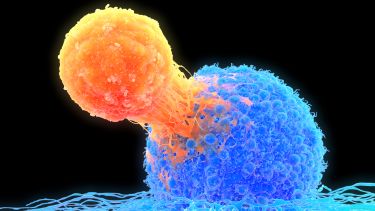Professor Elizabeth Smythe and Dr Elena Rainero will soon begin research projects that will aim to ultimately improve the treatment of a range of cancers. The researchers will join others from across the University as part of the new cancer research hub in Yorkshire.
The hub overall has received £10 million in new funding to help transform the prevention, diagnosis and treatment of cancer.
In total ten world-leading research studies are to be funded that will aim to accelerate understanding of cancer and find cures that will save lives in the region and beyond.
The new research will focus on key themes such as the use of cutting-edge technologies to improve the diagnosis and treatment of cancer and exploring new ways to personalise treatment so care can be precisely tailored to each patient.
Rme-6 as a novel therapeutic target to overcome cabozantinib resistance in triple negative breast cancer - Professor Elizabeth Smythe
Triple negative breast cancer (TNBC) is a particularly aggressive form of breast cancer with a poor prognosis. The usual treatment for TNBC is chemotherapy but, although there is often initial success with such treatments, the tumours often become resistant and this can lead to the spread of the cancer cells to secondary sites in the body.
TNBC often expresses high levels of epidermal growth factor receptor (EGFR), a signalling protein which instructs cells to proliferate. Current research from the Smythe lab has identified a protein, Rme-6 (also known as GAPVD1), that affects how EGFR works. The team found that when they remove Rme-6 from breast cancer cell lines, the cells divide at a slower rate. Even more importantly, getting rid of Rme-6 makes aggressive triple negative cancer cells much more vulnerable to a chemotherapy drug called cabozantinib.
The goal of this research project is to understand exactly how Rme-6 makes these cancer cells resistant to cabozantinib. By doing this the researchers hope to find new ways to treat this difficult type of breast cancer and potentially make existing treatments work much better.
We are really pleased to have the opportunity to translate our basic cell biology studies on the function of Rme-6 to explore its potential as a therapeutic target for triple negative breast cancer.
Professor Elizabeth Smythe
Elucidating the role of the Rab25/ADAMTS5 axis in peritoneal metastasis - Dr Elena Rainero
Recent research has identified two proteins, Rab25 and ADAMTS5, as factors that support the migration and invasion of ovarian cancer cells. This new project will characterise in greater detail the mechanisms by which these proteins facilitate these processes, using both ovarian and pancreatic cancer cell lines as models.
The researchers have developed laboratory systems to model the initial stages of metastasis formation. A central aim of this project is to determine whether these proteins, Rab25 and ADAMTS5, could represent novel drug targets to limit the formation of metastasis - spreading of cancer cells, which is a leading cause of death in cancer patients. The outcomes of this research will have the potential to inform the development of new therapeutic strategies aimed at inhibiting cancer progression.
We are very excited about this project, as this will allow us to better understand how cancer cells form metastasis. We feel it has the potential to lead to the development of novel therapies against ovarian and pancreatic cancer metastasis in the future.
Dr Elena Rainero

